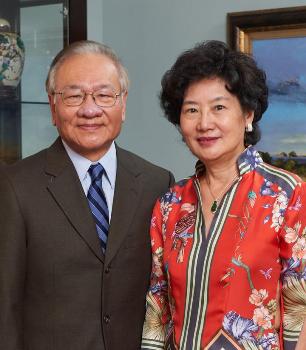Jan 30 2016
The co-developer of Remicade®, one of the three top-selling drugs in the world, has donated more than $500,000 to fund what will be known as the Iris and Junming Le Foundation Super-Resolution Microscopy Facility on the Florida campus of The Scripps Research Institute (TSRI).
 Through their foundation, Iris and Junming Le have funded a new microscopy facility on the Scripps Florida campus. (LILA PHOTO)
Through their foundation, Iris and Junming Le have funded a new microscopy facility on the Scripps Florida campus. (LILA PHOTO)
“We are grateful to Junming and Iris for their generous contribution,” said Chair of the TSRI Department of Neuroscience Ronald Davis, who will oversee the new facility. “The gift will have a dramatic and highly positive effect on the brain science pursued by our department. This is the perfect opening to what will be a genuinely state-of-the-art facility right here in Jupiter.”
The new donation will support the purchase of a powerful microscope that will give Scripps Florida neuroscientists an extraordinarily detailed view of the brain.
“Our foundation gives money to the best institutions and hospitals to support basic medical research and patient care through those projects we think will be successful,” said Junming Le, chairman and director of The Iris and Junming Le Foundation and adjunct associate professor of microbiology at New York University School of Medicine. “This is certainly one of them. When I learned that this microscope could advance the understanding of the brain and its function, I realized this would be an important investment for us. That kind of information could lead to breakthroughs in diseases like Alzheimer’s.”
The new microscope will be one of the most advanced available. Known as a structured illumination microscope, the technology uses a super-imposed pattern (grate), taking multiple images at various angles. These images are then merged—effectively doubling the resolution of a traditional light microscope.
“With this super-resolution microscopy,” Davis said, “we will be able to see synapses between neurons and to actually count them—to determine, for example, if the number of neurons in a brain affected by Alzheimer’s or Parkinson’s disease is different than a normal brain. This is a nearly unimaginable leap forward.”
Funding for The Iris and Junming Le Foundation, based in New York and Boca Raton, is the legacy of Junming Le’s invention of Remicade®, a drug used to treat autoimmune diseases, such as rheumatoid arthritis, psoriasis, Crohn’s disease and ulcerative colitis. Remicade®, which is currently manufactured and marketed by Johnson & Johnson and Merck, has been prescribed to more than two million people worldwide.
For more information on The Iris and Junming Le Foundation, see http://www.thelefoundation.org. For more information on Scripps Florida’s Department of Neuroscience, see http://www.scripps.edu/research/neuroscience/index.html.